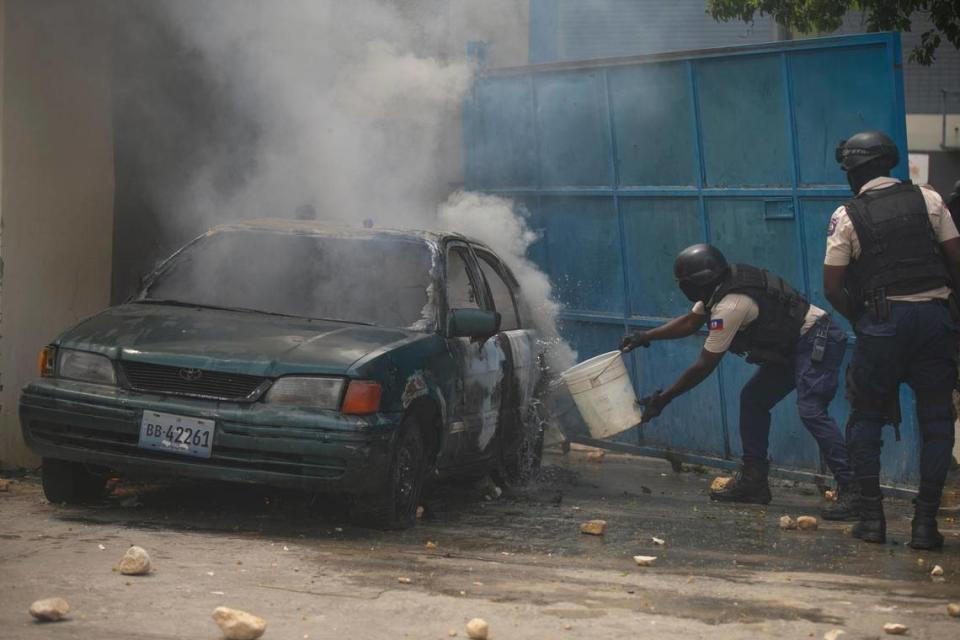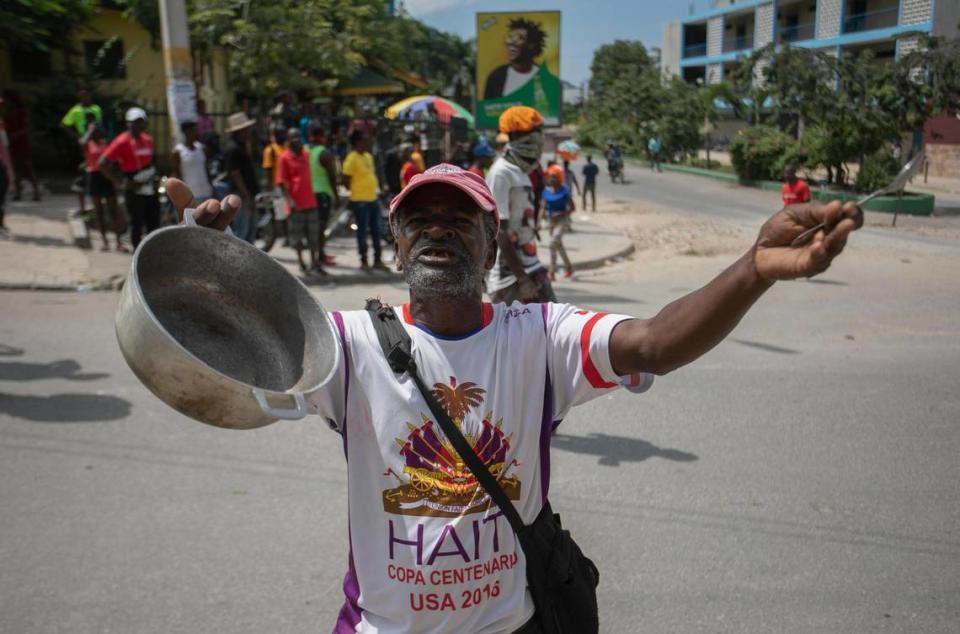Haiti Prime Minister Ariel Henry appeals for international help amid humanitarian crisis
- Oops!Something went wrong.Please try again later.
Haiti Prime Minister Ariel Henry is appealing for support from the international community to help his crisis-wracked country confront a growing humanitarian catastrophe and save lives as a deadly cholera outbreak sweeps across Haiti, potable water becomes increasingly scarce and gangs continue to block roads and the flow of fuel from its main terminal.
“We want them to provide all the support that is necessary to prevent people from dying,” Henry said in an address to the nation that was just over seven minutes long.
The target of ongoing anti-government protests by Haitians fed up with the rising costs of food and fuel — as well as political and business interests seeking to oust him from office — Henry was not specific in what that help should look like and stopped short of outright asking for foreign military intervention.
The issue remains a thorny one in Haiti, where those who oppose the return of foreign troops on Haitian soil have been loud in their protests as they reference past failed foreign interventions. However, in recent days, some Haitians who once opposed the idea have been increasingly warming up to the possibility as a powerful gang federation known as the G-9 continues its stranglehold on the country, effectively bringing life to a halt.
Communities are running out of food, stores shelves are bare and drinking water is now a scarce commodity after some producers ceased production due to no longer having diesel. Additionally, some are frightened by the resurgence of cholera. In the past, infections were treated with humanitarian teams traveling the far reaches of the country to provide soap and clean water for washing, re-dehydration solution and the launching of communications campaigns.
None of that, however, is possible today without help. Well-armed gangs continue to block roads and terrorize communities in many areas of the country, and in Port-au-Prince, the G-9 has blocked all access to the seaports and port terminal with trailers. Police, outgunned, tired and themselves running out of fuel, have not been able to take back the ports or the streets from the gang. Meanwhile, the protests have continued, often turning violent.
The gang is now entering its fourth week since it began blocking access into and out of the Varreux fuel terminal. In that time, all of the country’s fuel reserves have been depleted. Banks, supermarkets and other businesses have announced reduced hours; schools have delayed the start of the school year and hospitals have stopped accepting new patients.

An appeal by more than a dozen foreign diplomats on Tuesday for “a humanitarian truce” and the reopening of Varreux has so far gone unheard.
“We want potable water and medication to reach the people who are sick in this moment where cholera has started to resurge, for the factories that produce water to restart production; we need doctors and nurses to be able to get to the hospital, for the ambulances to circulate, for hospitals to restart functioning,” Henry said. “We need them to help us to unblock the roads throughout the country, for the gas to flow everywhere, for all the children to go to school without fear, so that everyone can go about their occupation without fear.”
Though political observers say deploying foreign troops to Haiti may be a hard sell, they also note that in the current situation Haiti finds itself, only one country can make that happen — the United States. There was no indication Wednesday night if Henry had made such a request.
READ MORE: Push for U.S. sanctions against supporters of Haitian gang violence grows in Congress
Over the weekend both the government and the United Nations confirmed a cholera outbreak that UNICEF has said puts at risk the well-being and health of 1.2 million children living in Haiti’s capital. While seven deaths and five positive cases of cholera have been confirmed, an additional 60 suspected cases are being investigated just in the Port-au-Prince metropolitan area, UNICEF reports.
Cholera was first introduced in Haiti in October 2010, when U.N. peacekeepers from Nepal infected a tributary of the Artibonite River with their wastewater from a nearby base. At the time of the introduction, Henry was a top aide in the ministry of health and headed the government’s response, which was eventually joined by both local healthcare and international aid agencies.
Over 10,000 Haitians would eventually die of the disease and more than 800,000 would become infected — leaving the U.N. open to criticism from victims and their families in addition to lawyers and human rights advocates over its response and handling.
Until the recent cases were confirmed over the weekend, Haiti had not had a single confirmed case of cholera in more than three years and was on the road to eradication. Public health experts say the lack of access to clean, drinking water during the ongoing surge in gang violence has left the population vulnerable to a resurgence.

In his address, Henry told Haiti’s nearly 12 million population that the situation “is grave.” He appealed to Haitians to “show compassion and humanity,” and to come together for the sake of the country.
He told his fellow countrymen and women that he knew they are going through a difficult time and the cost of living is rising. However, he held his ground on the recent hike in fuel prices, which helped ignite the latest round of anti-government protests and demands for his departure from office.
“In the new Haiti we want, we want to change the way we manage state finances,” he said, noting the recent reforms weren’t just directed at reducing $400 million in fuel subsidies and shutting down a lucrative black market but collecting millions in uncollected customs duties from tax dodgers. “You have to agree with me, we can’t take all the customs revenues to serve a small group of people and to subsidize a single product.”
Criminals, Henry said, were holding Haiti hostage and attempting to bring “a whole people on their knees” because they think it’s the only way to get into power.
“The irresponsible and criminal behavior of these people has created a humanitarian crisis that we have never seen, we have never lived on the land of Haiti and that threatens the sovereignty of Father Dessalines,” he said. “We cannot stand by and watch some bandits, associated with some bad politicians and some bad people, plunge our country into an unparalleled mess.”

